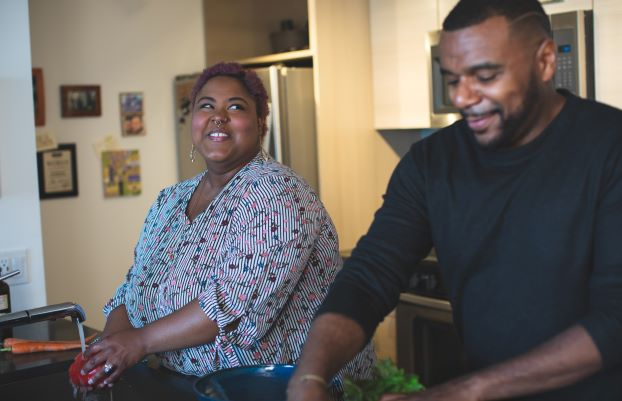|
Latest PostsShow All Recent PostsArchive
TagsEverything Intuitive Eating Weight Loss Health At Every Size (R) Health Kids Holiday Eating Halloween Eating Disorder Non-Diet Approach Food Relationship Emotional Eating |

Image: Photo by Esther Wechsler on Unsplash
Written By Suzanne Dietrich, RD, Edited by Kim Dietrich
Like many of you, my head and heart have been abuzz this week with a swirl of thoughts and emotions. None of us has been here before and it's hard to know what to do and how to react, let alone how to explain what’s going on to our children. I wanted to reach out to share some thoughts on Intuitive Eating to help you take care of yourself during these uncertain times.
FOOD AND YOUR EMOTIONS
Your relationship with food may feel kind of strange right now. With so many changes in your routines – whether with family care and coordination or with having to suddenly work from home – you may find yourself using food to cope. You may not be eating enough or you may find yourself eating a lot more than usual.
YOU ARE NOT ALONE
If you have chosen eating as a way to deal with the uncertainty you are feeling – know that you are not alone. None of us has ever gone through this situation before! I am here to remind you that eating to cope with your emotions is completely okay. When we feel overwhelmed, it’s totally natural to turn to the instant gratification and comfort that food can offer us.
If you have been working on improving your relationship with food and becoming an intuitive eater – know that this is still what intuitive eating looks like – it is normal to eat differently in times of uncertainty. Learn more about a self-compassionate approach to intuitive eating here.
Like myself, you may also be worried about running out of food. Not wasting food also seems especially important right now. I’m doing my best not to pass these worries on to my kids, so I have come up with some strategies to help me feel a bit more in charge of the food situation in our home.
WHAT DO I HAVE ON HAND?
Take stock and make a list of what you've got – do an inventory of your fridge, freezer and pantry. I made a list of the fresh foods and leftovers in my fridge and stuck that on the door. Each day I take a look at my list and incorporate those items into meals or snacks for the day. I also keep leftovers in a specific area of my fridge so they don't get overlooked.
MEAL PLAN
Create a meal plan – yes I said that! Meal planning can be a form of self-care. I resisted it for a long time but eventually realized that it helped to decrease decision fatigue because I didn't need to figure out what we were eating each day! If planning for a whole week feels intimidating – start with a day at a time, or 3.
There can be tons of room for flexibility with meal planning, but jotting down some ideas can help you figure out what you need, especially with advisories to limit our access to public spaces. Planning for three meals and 1-3 snacks each day is typically best for our blood sugar and mood, but do whatever works best for you.
Try to plan for satiating meals, but keep it low stress. Make a list of meals that you usually eat – and ones that sound easy that you'd like to try. Boxed meals, canned goods, frozen foods and prepared meals are all okay and can still nourish you. Simplicity is key – what is easy to prepare? If you have kiddos at home this is super important! Try to include some of everyone's favourites on your plan – you can even get your kids involved by asking them to pick one meal they'd like to have. I do have some simple recipes here if you need some inspiration.
SHOPPING
Compare what you have on hand with your rough menu plan and create a shopping list from there – don’t forget to consider spices and condiments! Many grocery stores are now offering online shopping with order pick up or you can also get your groceries delivered. If you are shopping in person, keep social distancing suggestions in mind and try to resist the urge to over-buy. The Public Health Agency of Canada is urging people to increase their food supply slowly so there is enough for everyone in our stores. Some people can't afford to shop in bulk, so be mindful of others and consider only purchasing what you will need in the short term.
If you are in a situation of food insecurity, remember there is no shame in asking for help. Food is a human right. (Our current food distribution system does not allow food for all – but that’s a whole other blog post). I'm here to remind you that we all deserve and need to eat.
You can find food assistance programs here: Kitchener Waterloo, Guelph or Across Canada.
If you are in a position to donate food or money to any of these emergency food providers please do so.
FOOD STORAGE
Once you have your food, aim to use your perishables first, then canned, packaged and frozen food. Meat/chicken/fish, bread products and milk can all be frozen. Be sure to use safe thawing techniques – you can learn more here.
MEAL SCHEDULE
Plan a bit of routine around meal times for your family – most kids thrive on routine and many adults do as well. Involve kids with cooking, meal prep, setting and clearing the table.

Image: Photo Michale Poley for All Go
LET’S EAT!
Keep in mind that even though your hunger and fullness cues might be a bit off due to stress, it is still important to nourish yourself, even if you aren't feeling hungry. You can try to take your mind off things during your meal by playing some music or having a phone conversation with a family member or friend. If you find you are eating more than you usual, try the opposite – work on slowing down your eating by focusing on the individual senses: zero in on the taste, the aroma, or the texture of your food. Perhaps move away from eating in front of the TV, or think about repeating some gratitude intentions throughout your meal.
PRACTISE GRATITUDE
Try to keep things light during meal times. You could start with gratitude or a prayer. At our house we like to do the following ‘Rose’ activity during meal times:
What is your rose for today? (a good thing that happened) What is your thorn from today? (a not-so-good thing that happened) What is your bud? (something you are looking forward to).
SELF CARE
If you are ill, due to a virus, cold or flu, your sense of smell and taste might be off. Again, please continue to nourish yourself with three meals a day – nourishment will help you heal. Rest as much as you are able.
Please do yourself a favour – keep off the scale and avoid using dieting to try to control this situation. While people do turn to dieting when not feeling good about themselves or when they want to regain a sense of control, dieting will only give you a false sense of security, mess up your metabolism and potentially leave you feeling worse than you did before.
Lastly, keep moving. I know this might be really hard for some of you, with interrupted access to your usual place of movement. Try to continue to move in gentle ways – whether it is a walk around the block, a hike on a trail or by doing a virtual yoga class. Check out virtual classes... In Kitchener: Queen Street Yoga, Guelph: Arrive Yoga or Dianne Bondy online.
Intuitive eating is about being gentle with yourself. This does not need to be a time where you set lofty goals, learn a new language, create a masterpiece or clean your whole home. Do what works for you, without the pressure. Remember that nourishment goes beyond the food you put in your mouth. Stay safe, wash your hands and stay connected with those dear to you. Together we will pull through this. Reach out if I can be of any assistance to you, my practice is online now until the waves settle.
Be kind to yourself my friend.
|
|
|
|
|
|
We are a proud member of